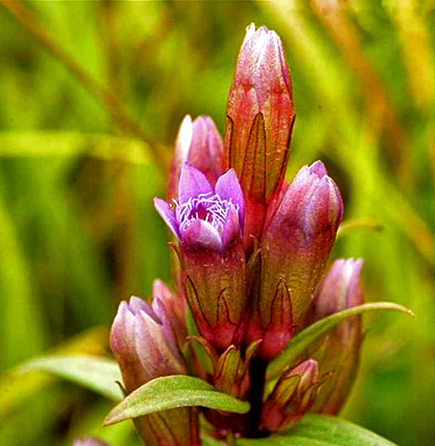Hercampuri - Gentianella alborosea

Common Names: Hercampuri, Harumpiri, Bitter Tea, Té amargo, Hercampure, Hircampuri, Chavín Pureckhjircan, Harcapura, Gentianella alborosea (Latin), Andean Gentian, Peruvian Bitter Herb
Latin Name: Gentianella alborosea
Origin: Europe, South America, North America
Short Introduction
Hercampuri, also known as Gentianella alborosea, grows wild at high altitudes in South America, the United States, and Europe. Hercampuri reproduces by seeds, which are released from its lily-like flowers when the fruit ripens.
Detailed Description
Hercampuri is prized for regulating metabolism, reducing body fat, relieving abdominal pain, supporting liver and vein health, and aiding in the treatment of hepatitis. Its Latin name is Gentianella alborosea.
Botanical Information
Gentianella alborosea is a small perennial shrub, usually reaching 10–15 cm in height. Its dark brown stems hold narrow, oval to pointed yellow-green leaves. Hercampuri flowers are deep blue to purple, and its seeds are black or brown. This herb tends to grow in clusters in remote, difficult-to-access regions of the Peruvian Andes. The roots are thin and yellow-brown, but in herbal medicine, only the above-ground dried parts are used. Interestingly, Gentianella alborosea is considered one of the bitterest herbs in the world.
Origin and Distribution
Hercampuri originates from Peru, thriving at elevations between 2,800 and 4,300 meters above sea level. It has a long history of use, as even the ancient Incas relied on it for treating fevers caused by malaria in Peruvian medicine. Today, this Amazonian treasure is cultivated in Europe as well, but its largest producer remains the Americas.
Usage / Dosage
Antioxidant properties—especially for the blood—help lower lipid levels and reduce cholesterol. Hercampuri regulates metabolism and is widely used as an effective natural support for weight loss. It's also noted for aiding in the treatment of varicose veins, hepatitis, and hypertension. Gentianella alborosea is a diuretic, promoting the elimination of electrolytes and water through urine, and stimulates bile production—supporting prevention of gallstones. It benefits poor digestion, but does not typically suppress the appetite. Hercampuri energizes the body and supports healthy blood circulation. Additionally, the herb has hypoglycemic effects, making it especially valuable for athletes under heavy physical stress and those with irregular eating habits. Hercampuri is also used to ease stomach pain and relieve heartburn. It plays a role in liver regeneration and stimulation (useful in liver conditions like cirrhosis and inflammation), blood detoxification, and support during infections. Gentianella alborosea stimulates the central nervous system (CNS).
Active Compounds
Hercampuri is high in bitter glycosides such as gentiomarina and gentianin, as well as other bitters. Another component responsible for its strong bitter taste is erythaurin.
Traditional Dosage:
Use 1 teaspoon (approximately 1g) of Hercampuri herb per 1 liter of cold water. Bring to a boil and simmer for 5 minutes, then strain. Drink one glass (about 250 ml) after meals, three times daily.
The recommended usage duration is a maximum of 2 months, followed by a one-week break before resuming.
Warning: Not recommended for pregnant or breastfeeding women or children. It is also unsuitable for individuals suffering from ulcers.
